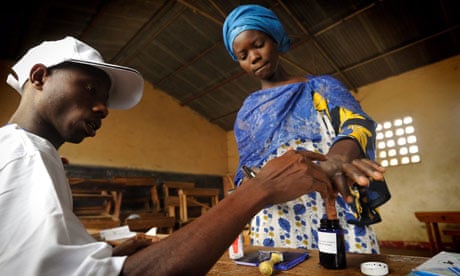Voters in Burundi are today issuing a verdict on President Pierre Nkurunziza's rule after the withdrawal of all the opposition candidates turned the election into a referendum.
In the first public presidential poll since the end of the civil war, Burundians placed their ballots in a white or black envelope to vote for or against another term for Nkurunziza, 46, who is expected to retain power comfortably. The early turnout was low due to the opposition boycott as well as heightened tension, with dozens of grenade attacks reported across the east African country over the past month.
The six presidential challengers withdrew after May's district polls, alleging fraud by the ruling CNDD-FDD party, which won nearly two-thirds of the vote. European Union observers said the local elections had met international standards.
The series of polls, which include a parliamentary ballot scheduled for July, are viewed as a key test of Burundi's stability as it emerges from decades of conflict. Up to 300,000 people were killed in ethnic fighting between 1993 and 2005, a period of all-out civil war. Hundreds of thousands more died in massacres dating back to 1972, when the ruling Tutsi elite used the army to suppress the Hutu majority.
The deadly cycle of attacks and reprisals – which were ultimately overshadowed by the scale of the genocide in neighbouring Rwanda – resulted in a tenth of Burundi's population fleeing the country. Many have returned since Nkurunziza, who led a Hutu rebel group during the war, was elected by parliament five years ago. In an attempt to reduce ethnic tensions, power sharing was enshrined in the new constitution, with a 60-40 split between Hutus and Tutsis. The last remaining rebel group, the Forces for the National Liberation, laid down its arms last year.
While the fighting has ended, peace remains fragile. Nkurunziza's rule has seen some improvement in areas such as health and education. But the International Crisis Group (ICG) warned earlier this year of the increasing authoritarian tendencies of his CNDD-FDD party, which it said was harassing media and civil society organisations and preventing opposition groups from operating freely.
The report was especially critical of the ruling party's youth wing, suggesting its "physical training, war songs and quasi-military organisation raise the spectre of militia violence and a major intimidation campaign". Other former rebel groups were mobilising their own youth units to oppose the threat, according to the ICG.
Though the election dispute is unlikely to lead to a resumption of hostilities, it has raised concerns about the security situation in the country. The grenade attacks – there were three in the capital, Bujumbura, on Sunday night – have claimed at least eight lives since the district polls, with dozens of people injured. The government and opposition parties have traded blame for the blasts. Opposition leaders have said they will also boycott the parliamentary poll.
